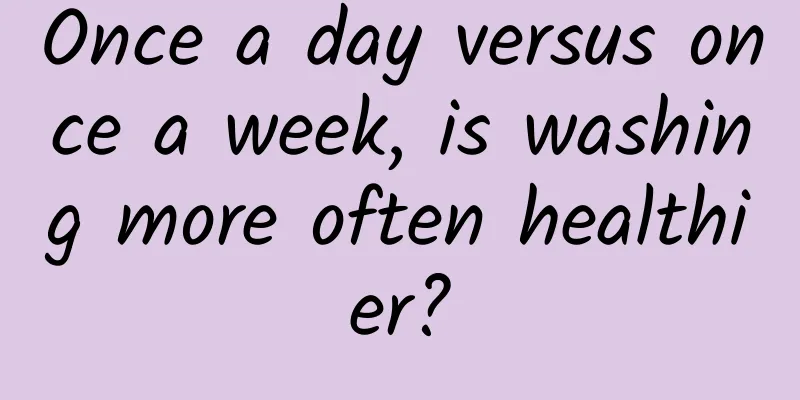Once a day versus once a week, is washing more often healthier?

|
Are people who take a shower once a day healthier or people who take a shower once a week healthier? In fact, no matter which bathing frequency is used, it has its own advantages and disadvantages. What is the difference between the two, and how should we choose the bathing frequency that suits us? Next, the pop-up editor will take you to find out. Take a bath once a day benefit Taking a bath once a day can keep the skin clean and help prevent bacteria from growing on the skin. It can clean the dirt on the skin surface in time, such as sweat, aging and falling cells, oil secreted by pores, as well as dirt and microbial attachment caused by the surrounding environment. Especially for people in special occupations such as medical workers, cleaners and athletes, or people who sweat a lot, taking a bath once a day in high ambient temperatures and in summer can better keep the skin clean. And taking a bath can also help relax the body to a certain extent and promote the body's metabolism. harm Taking a bath once a day may lead to the risk of over-cleaning, which may damage the original skin barrier. After taking a bath, the skin may feel red, dry, itchy and other discomforts. Especially for people who are in a relatively cold or dry environment, or people who like to scrub their bodies, it is easy to aggravate the dryness of the skin. Therefore, you should pay attention to skin care and apply a moisturizer suitable for your skin type after washing. Take a bath once a week benefit For people who take a bath once a week, the oily secretions on the skin surface can protect the skin to a certain extent and prevent dry skin. For those with wounds on the skin or local incisions after surgery that have not healed, the affected area should not be exposed to water. Taking a bath once a week can reduce the possibility of infection compared to taking a bath once a day. harm Taking a shower once a week may cause too much dirt on the skin surface, which may cause discomfort symptoms such as itching and greasy feeling on the skin, and may also produce a certain odor. At the same time, it is also easy to cause too many bacteria to grow on the skin surface, which is not good for skin health. The best time to take a shower during the day In terms of the time of day, it is generally recommended to take a bath one hour after a meal or one hour before going to bed. You should note that it is not advisable to take a bath when you are hungry or within one hour after a full meal. The water temperature should be appropriate. Regardless of spring, summer, autumn or winter, the bath water temperature should be close to body temperature, that is, 27-35℃. Too cold or too hot water will irritate the skin and affect the blood distribution throughout the body. It is not good to take a shower right after a meal. After a meal, the gastrointestinal tract needs a lot of blood to help digestion and absorption. At this time, the blood supplied by the heart to other organs and the brain will be reduced accordingly. Therefore, this is the reason why people with qi and blood deficiency feel sleepy and weak after a meal. If you take a shower or bath in a bathtub at this time, small blood vessels throughout the body will open. When the small blood vessels in the skin open, all the blood will fill the small blood vessels in the skin, and the skin will turn red. At this time, with the blood from the gastrointestinal tract, the remaining blood supply to the head or other organs is even less. Taking a bath at this time may cause fainting. Many people often experience dizziness or even fainting, palpitations, and chest tightness when taking a bath or bath in a bathhouse after drinking or eating. There are three benefits of taking a shower after eating: 1. Reduce the chance of hypoglycemia. Taking a bath on an empty stomach consumes too much calories and energy, which can lead to hypoglycemia coma and cause dizziness, headache, transient loss of consciousness, etc. Therefore, the benefit of taking a bath after a meal is to reduce the chance of hypoglycemia and a series of adverse reactions. 2. Reduce the incidence of cardiovascular and cerebrovascular diseases. After a meal, the pressure on the cardiovascular system is reduced and the burden is reduced. At this time, the blood vessels undergo transient expansion after a bath, and the congestion will not immediately cause an imbalance in vascular elasticity and fragility. Therefore, the benefit of taking a bath after a meal is to reduce cardiovascular and cerebrovascular complications. 3. Taking a bath after a meal will keep your blood pressure basically normal and will not cause an increase in blood pressure. Taking a bath on an empty stomach will cause blood pressure fluctuations and instability. Taking a bath after a meal will avoid the occurrence of unstable blood pressure. Therefore, how often you should take a bath and when you should take a bath during the day should be determined according to your own specific situation, which is beneficial to your health. If it is hot in the summer, when your skin is more exposed and you sweat more, you can choose to take a bath once a day. If it is cold season, or in a dry environment, when you sweat less or basically do not sweat, you can choose to take a bath every 3 days or so. However, for the elderly who have less activity, or people with skin diseases or people with dry skin or even itchy skin, you can also choose to take a bath once a week or even longer. In short, the choice of bathing frequency varies from person to person and is related to age, skin properties, season, and environment. Image from Pexels |
<<: How serious is the "second-degree minor injury" of the Tangshan girl?
>>: Is the world seen through cat’s eyes the same as the world seen through human eyes?
Recommend
This preservative commonly found in cakes and breads is actually a "deadly assassin"?
It has been almost half a month since the Mid-Aut...
1,100 new local infections! Omicron has another evolutionary branch, experts remind: This is crucial
From 0:00 to 24:00 on March 10, 555 new confirmed...
Is Cistanche deserticola and Polygonatum odoratum tea good?
I recently heard my colleagues discussing the ben...
Are bigger planes safer? The higher you fly, the greater the risk? These "10 dark minutes" are a matter of life and death...
Expert of this article: Lin Wenjie, engineer, sen...
Air conditioning was invented to "save you"? Wrong! The truth is...
In the hot summer, air conditioners have become a...
The efficacy and function of Kang Gu Lao
Nowadays, our living standards are constantly imp...
The efficacy and function of sea harrier gall
There are many common Chinese medicinal materials...
Please fill in the blank: Eat meat but not garlic, ___________
Audit expert: Wang Guoyi Postdoctoral fellow in N...
Heavy rains hit South China, and the fourth-level emergency response for flood control was launched! How to prevent floods scientifically?
The reporter learned from the Ministry of Emergen...
How does self-heating underwear generate heat out of thin air?
Key Points ★ Heat does not come out of nothing. H...
The efficacy and function of Castanopsis bark leaves
Traditional Chinese medicine culture is profound ...
Seeing ancient costumes, you call them Hanfu? You are being treated as uneducated again!
Source: Hunzhi...
What are the functions of traditional Chinese medicine?
When it comes to Chinese medicine prepared aconit...
The efficacy and function of Yangtian Bell
We can often see Yangtian Zhong in our daily life...









